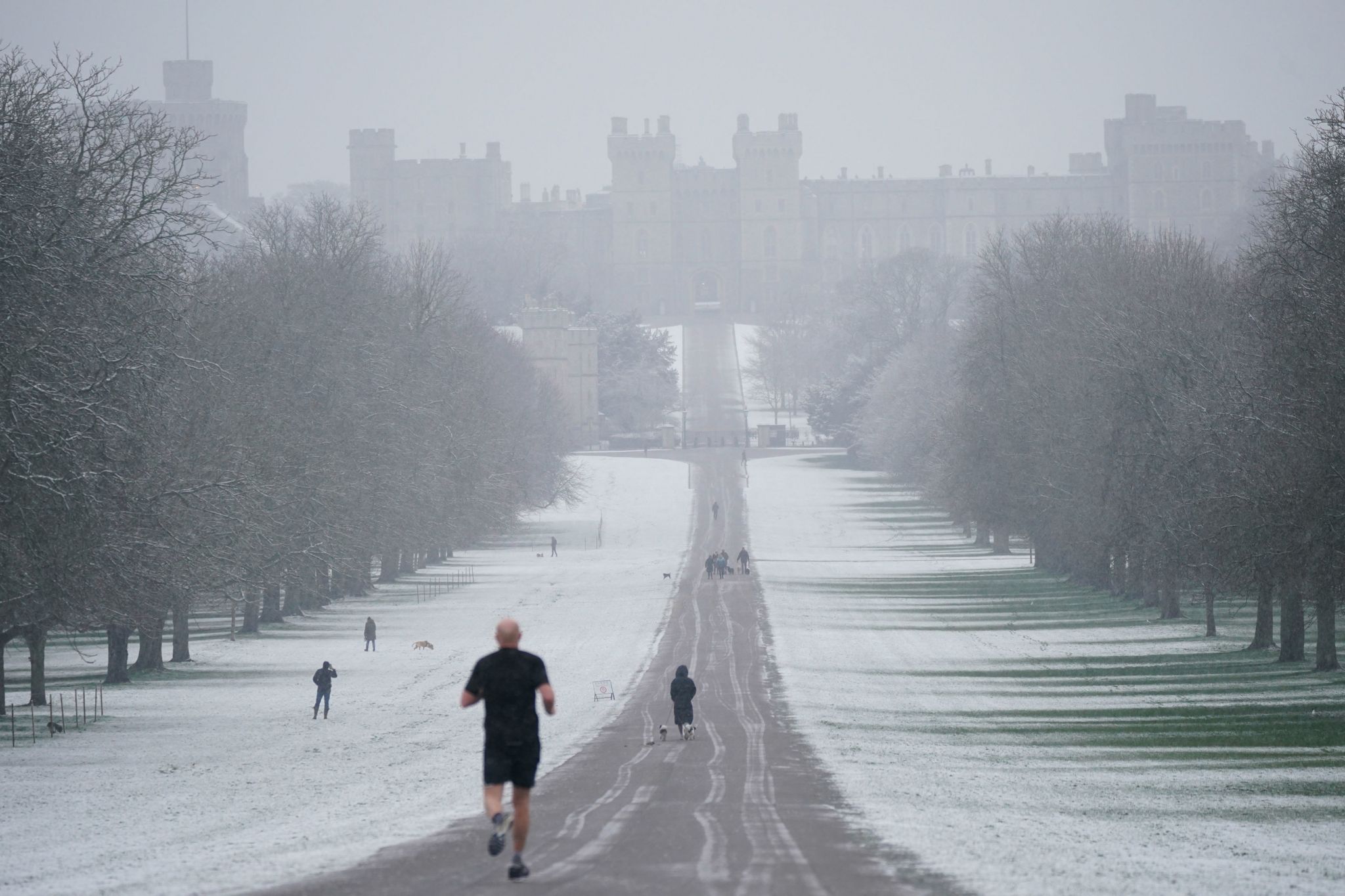More snow to sweep across UK as Arctic blast hits
- Published

More snow is expected to sweep the country on Thursday as an Arctic blast continues to hit the UK.
Forecasters have predicted snow storms to hit large parts of central and northern England, with "strong winds bringing blizzard conditions".
An amber warning is in place for heavy snow causing significant disruption in an area stretching from Stoke-on-Trent to Durham.
It comes as the UK recorded its coldest March temperature since 2010.
The Met Office's amber warning - from 15:00 GMT on Thursday until midday on Friday - means delays on roads and rail are likely and some people may be left stranded.
There is also a chance of power cuts and some rural communities being cut off.
Forecasters says about 10-20cm of snow will fall across the area, with 30-40cm in some places.
Snow has already caused disruption for some evening rush-hour commuters.
Less severe yellow weather warnings for snow and ice remain in place for much of the UK. These mean journey times are likely to be longer and icy patches on untreated roads and pavements are expected.
National Highways has warned drivers in the West Midlands and the east of England between 15:00 GMT and midnight on Wednesday to check ahead and plan for disruption.
Watch latest UK weather forecast: Will I get snow in my area tomorrow and into the weekend?
A similar alert is in place for the North West, North East and Midlands between 09:00 GMT on Thursday and 08:00 GMT on Friday.
Motoring organisation the RAC has urged drivers to take the weather warnings seriously, and work from home if possible.
Those with no choice should make sure tyres are properly inflated, and oil, coolant and screenwash are topped up, it said.
ScotRail says it aims to run a full service this week, but has advised passengers to check their journeys as disruption is possible. National Rail has also warned snowy and icy conditions could affect south-eastern services over the next few days.
Other warnings in place are:
- A yellow warning for snow and ice is in place across parts of Wales, and southern and central parts of England until 07:00 on Thursday
- A yellow warning for snow and ice for the Scottish Highlands is in place until 10:00 on Thursday
- Another yellow warning for snow and ice in the south east of Scotland, from Edinburgh down to Newcastle upon Tyne, is in place until 07:00 on Thursday
- A yellow warning for just snow is in place from 07:00 on Thursday until 14:00 on Friday, taking in Northern Ireland, parts of Wales, central and northern England, and the Scottish central belt.
A Met Office amber warning for #snow has been issued for parts of the Peak District and Pennines tomorrow into Friday. Significant disruption is likely. https://t.co/USszqI4UI4 pic.twitter.com/Kvrx8Y5Q9Y
— BBC Weather (@bbcweather) March 8, 2023
On Wednesday, temperatures dropped to lows of -8C in the north of England.
Flights from Bristol Airport were earlier suspended due to the snowfall, with a number of routes cancelled.
In the north of Scotland, temperatures were set to stay below freezing throughout Wednesday.
In south Wales, more than 100 schools closed on Wednesday due to the snow.
BBC Weather's Jennifer Bartram says the cold spell is due to a change in wind direction "with northerly winds bringing cold air down from the Arctic".
It is predicted snow is more likely to settle as the cold weather moves across much of northern England, Northern Ireland and most of Scotland on Thursday.
She said although it was not unusual to have snow and cold weather at the start of March, "this feels like a bit of a shock to the system after what was a mild and relatively dry February for most".
To prepare for the cold spell, two old coal-fired power plants have begun generating again to help prevent potential shortfalls.
The plants in West Burton in Lincolnshire were due to close last September, but the government requested they stay open for an extra six months because of fears of possible power shortages.
Some ski resorts in Scotland have opened runs after the heavy snowfall, with Snowsport Scotland saying it hoped the recent weather would be "the start to another boost for the mountains".
"Looking at the forecast, this could be our biggest week of the year," said Alison Grove from Snowsport Scotland.
In Scotland, dozens of schools have already been closed as heavy snow continues to cause disruption.
A level-three cold alert has been issued by the UK Health Security Agency (UKHSA) for the whole of England, which is likely to be reviewed in coming days.
Dr Agostinho Sousa, the agency's head of extreme events and health protection, advised people to check on vulnerable relatives, adding that pensioners or anyone with an underlying health condition should heat their home to at least 18C (64F).
Veterinary charity PDSA advises giving dogs and cats extra blankets for their beds over the winter months. Raised beds can keep older dogs away from draughts, while cats may like high-up dens.